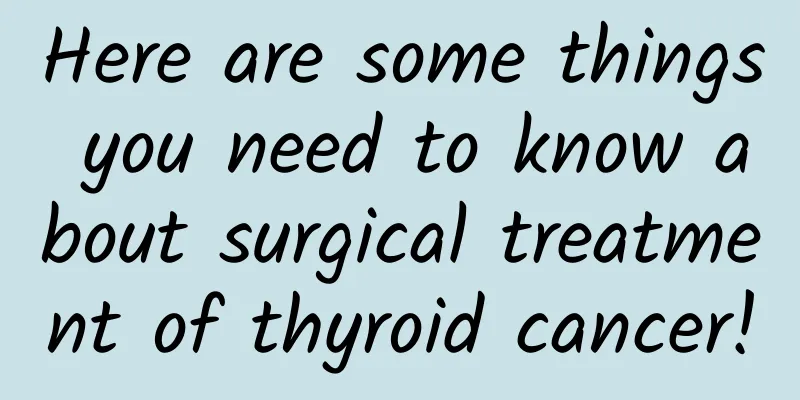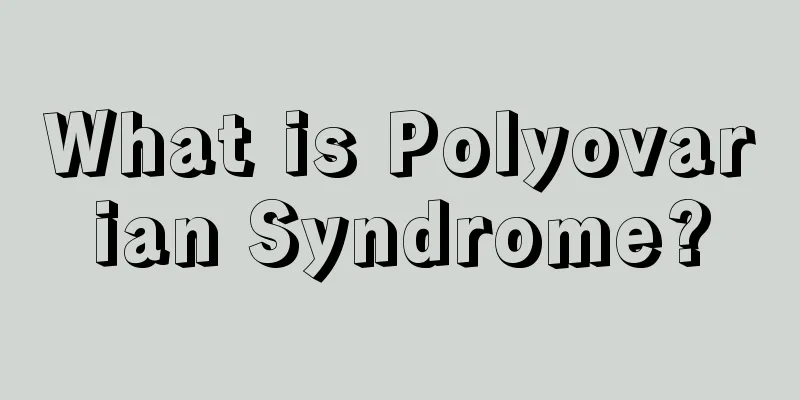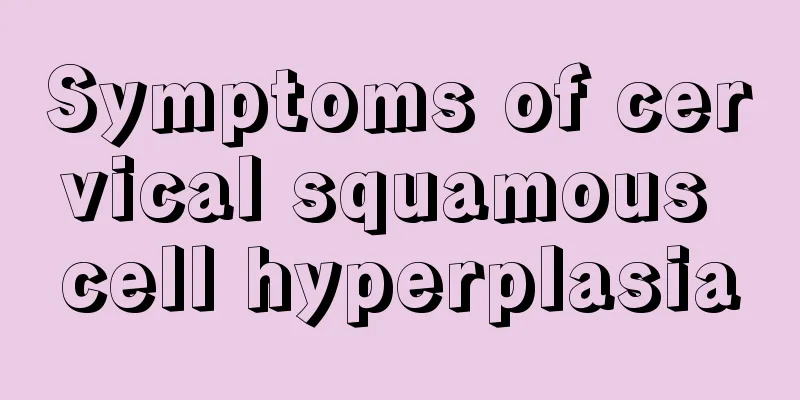Here are some things you need to know about surgical treatment of thyroid cancer!

|
Author: Zhang Bin, Chief Physician, Peking University Cancer Hospital Chairman of the Head and Neck Tumor Committee of the Tumor Branch of the Chinese Medical Doctor Association Reviewer: Li Guangwei, Chief Physician, Fuwai Hospital, Chinese Academy of Medical Sciences Vice Chairman of the Chinese Medical Association Endocrinology Society The thyroid gland, located in the front of the neck, attached to the trachea, is shaped like a butterfly and is known as the "most beautiful gland" in the human body. However, this most beautiful gland is prone to cancer, and many patients have to have it removed. 1. When treating thyroid cancer surgically, does it mean removing the entire thyroid gland? Currently, the surgical methods for thyroid cancer mainly include total thyroidectomy and unilateral lobectomy. The choice is actually determined by the patient's tumor stage. For example, if the thyroid cancer is small in diameter and only grows on one side, and no cervical lymph node metastasis is found before surgery, generally only one side is removed, that is, a unilateral thyroid lobectomy. If the thyroid cancer is large in diameter, or both lobes are cancerous, and lymph node metastasis is found before surgery, total thyroidectomy will generally be performed, that is, complete removal of both lobes of the thyroid gland, and the neck lymph nodes must also be cleared. 2. What are the possible complications of surgical treatment of thyroid cancer? From an anatomical perspective, the recurrent laryngeal nerve is located on both sides of the thyroid gland. It is the main motor nerve for the laryngeal muscles and has a diameter of only about 1 mm. In addition, there are four mung bean-sized parathyroid glands next to the thyroid gland. Its main function is to secrete parathyroid hormone and regulate calcium and phosphorus metabolism in the body. Therefore, the main risk of surgical treatment of thyroid cancer is temporary or permanent damage to the recurrent laryngeal nerve and parathyroid glands. If the recurrent laryngeal nerve is damaged, hoarseness may occur, and if the parathyroid glands are damaged, calcium deficiency symptoms may occur. Figure 1 Original copyright image, no permission to reprint In terms of the incidence of complications, the rates of recurrent laryngeal nerve and parathyroid gland damage are similar, with the probability of temporary injury being around 20% and the probability of permanent injury being around 2%. Of course, if the thyroid cancer is in a very advanced stage, it is difficult to preserve the parathyroid glands and recurrent laryngeal nerves because the cancer has already invaded these two parts. But if it is an early stage patient, the probability of damage is not high. 3. Do I need to take medicine for the rest of my life after thyroid cancer surgery? The thyroid gland is an endocrine organ. Its main function is to synthesize and secrete thyroid hormones. Thyroid hormones play a very important role in regulating human metabolism, growth, development, reproduction and other physiological functions. They are important hormones necessary for human metabolism and growth and development. After thyroid cancer surgery, whether one lobe is removed or all of it is removed, the patient may experience symptoms of hypothyroidism, such as listlessness, loss of appetite, dry skin, etc. Therefore, oral thyroid supplementation tablets are needed for replacement therapy and thyrotropin suppression therapy to prevent recurrence, but the time may be different. If a patient undergoes a total resection, he or she will have to take thyroid hormone for the rest of his or her life and cannot stop taking the medication. If the patient has undergone a one-sided resection, most patients will have to take the medicine for eight to ten years. If the thyroid cancer does not recur, you can consider slowly reducing the dosage of thyroxine tablets. If the patient does not have obvious symptoms of hypothyroidism, you can even stop taking the medicine. 4. Is the cure rate high after thyroid cancer surgery? For differentiated thyroid cancer, such as the most common papillary thyroid cancer, the probability of cure is very high. Our domestic data show that the probability of no tumor recurrence in 5 years is about 86%, and in large cities it can reach more than 90%. Especially for this early differentiated thyroid cancer, it can even be close to 100%. But for other types of thyroid cancer, the data is not so good. For example, for medullary carcinoma, the 5-year survival rate is about 70%, while for undifferentiated carcinoma, the 5-year survival rate may not even reach 10%. Therefore, postoperative follow-up is also particularly important. Figure 2 Original copyright image, no permission to reprint However, there is a 15%-40% recurrence rate for thyroid cancer after surgery, mainly lymph node recurrence and metastasis. Most cases can still be cured after tumor recurrence. Patients can use regular ultrasound examinations to detect abnormal swelling of lymph nodes, and then use puncture examinations to determine whether there is recurrence. For patients who have undergone total thyroidectomy and iodine-131 treatment, there is a very good indicator, which is thyroglobulin. If it is very low, it means there is no recurrence, and if the value is high, it indicates that there may be a recurrence. Therefore, after surgery, you must follow your doctor's orders for regular checkups to detect signs of recurrence in a timely manner and take proactive measures. |
<<: One of the “Four Major Chronic Diseases”! Beware of this Silent Killer
>>: Will long-term consumption of iodized salt lead to thyroid cancer? The answer is…
Recommend
How to arrange the bathroom reasonably? What are the requirements for bathroom arrangement?
We all know that the bathroom is an important pla...
What is it like when close friends become lovers? Will close friends become lovers?
What is it like for close friends to become lover...
What should I do if I have hemorrhoids?
Patients with hemorrhoids know that hemorrhoids a...
What causes swollen lymph nodes in the armpits of women?
The problem of swollen lymph nodes is relatively ...
Why do I have breast pain during menstruation?
Many women experience abdominal pain during menst...
Is it normal for a girl not to have her period for several months?
What is the reason why girls haven't had thei...
Can towels and bed sheets in hotels really transmit “that disease”?
One minute with the doctor, the postures keep cha...
Doctor, this is terrible, there is a ghost in my house...
This is the 2882nd article of Da Yi Xiao Hu story...
Women's private parts are itchy and have tofu residue
Many women have health problems such as tofu-like...
How long after giving birth is the same as normal people?
Although many pregnant women feel very relaxed af...
Precursor of adenomyoma cancer
Most cases of adenomyosis in women are benign dis...
Treatment of invasive hydatidiform mole
The explanation of hydatidiform mole on the websi...
Who is the 9-valent vaccine suitable for?
The 9-valent vaccine is for women between the age...
What should I eat to restore my uterus after miscarriage?
Female miscarriage is also called miscarriage, wh...
Can I eat green dates for medical abortion?
I believe many people know that people are very w...









